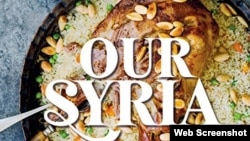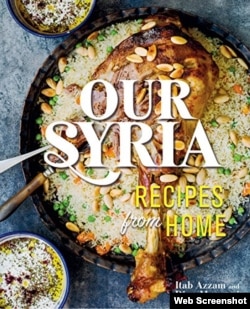Al Naeem Square in Raqqa was bustling with life before Islamic State took over the city and declared it its de facto capital in 2014. During the group's reign of terror, Al Naeem — or "Paradise Square" — became a stage for a murderous campaign of beheadings, gruesome public executions, and the burning of books and cigarettes. It got so bad residents started calling it "Hell Square."
Shaima recalls her childhood memories in her hometown of Raqqa. She remembers her daily summer trips to Al Naeem Square, when her brother used to take her to buy Syrian-style ice cream and she would eat it sitting on the grass amidst city lights and children's laughter. In 2015, she escaped Islamic State and her abusive husband, and went to southern Syria where she earns her living picking apples.
Despite the daily struggle to survive, Shaima never lost her passion for Raqqa's food and heritage. Her passion for her hometown's culinary arts is one of many collected and documented in a book of Syrian food culture put together by two women seeking to show a different side of Syria — a place that is so often associated with violence.
The authors
Itab Azzam and Dina Mousawi, who work in theater production, met in London. The idea of writing a book about Syrian food culture came to them when they were working in Beirut with a large group of Syrian women on a theater project.
"Sadly, Syria has become famous for playing host to one of the most hideous organizations on earth: ISIS," Azzam, a coauthor of Our Syria: Recipes from Home, told VOA. ISIS is an acronym for Islamic State.
Azzam, an award-winning filmmaker and theater producer based in Britain, grew up in Swaida in Hauran, an unglamorous mountain region on Syria's border with Jordan that gained its fame for being a hiding place for rebels and heretics. Mousawi, also a theater producer and filmmaker, grew up in Baghdad and experienced the tragedy of war when her family fled the city during the Iraqi war.
"We saw this was something positive about Syria — a way to highlight the country's food and culture, not just the misery, as well as the strength and resilience of Syrian women. And, of course, we just wanted to connect others with Syrians through food, which is something we all love," Azzam told VOA.
The inspiration
Azzam and Mousawi said they traveled around Greece, Germany, Lebanon and Syria meeting women who were displaced by the war, and learning their tricks and their secret recipes and, in the process, hearing their food memories, or how they still use food to connect them with home.
"Spending day after day with women who'd only recently escaped the war, we discovered what was special about each individual, and we found that, as well as resilience, a love of singing, jokes, and stories, all the women we worked with had another common ground: food," Azzam and Mousawi wrote in the foreword of their book.
Both women were seeking to present Syria's human face. Despite the gloom shadowing an entire country that is ravaged by war, Syrians in tiny flats in Beirut, Berlin and Bradford are searching for fresh ingredients "to recreate the dishes that remind them of home," they wrote.
Azzam and Mousawi said the people of Syria have been reduced to mere statistics, portrayed in the news as either villains or victims. Instead, the authors want to present Syrians like people from any other nation: "We have good people, bad people, we have doctors and teachers, plumbers and dancers. Just like everyone else, we're mums and dads, sisters, wives, brothers ... and we love to eat!"
About 11 million Syrians have been displaced, almost half of the population, according to United Nations High Commission for Refugees (UNHCR), with 4.8 million people fleeing to Turkey, Lebanon, Jordan, Egypt and Iraq, and 6.3 million displaced inside Syria.





